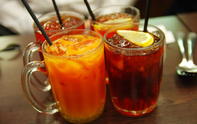Honeybush tea is available as a ‘normal’ tea and as a green, unfermented, tea.It has no caffeine and very little tannins. Therefore, unlike tea made from Camellia sinensis, honeybush does not develop a bitter taste on prolonged simmering. It is also used by Rastafarian healers as a carrier tea to mask the bitter taste of herbal preparations.The caffeine-free property makes honeybush suitable for nighttime drinking and for children.

Medical Benefits of Honeybush Tea
The tea is used for nervousness, to relieve constipation and regulate blood pressure. It soothes eczema and sensitive skin and was used by bush doctors to treat epilepsy.
The Department of Chemistry of the University of the Free State in South Africa has found substantial amounts of pinitol in honeybush tea. Pinitol acts as an expectorant, to treat coughs and also has an anti-diabetic effect, as it can lower blood sugar levels. Numerous studies have confirmed the beneficial effects of honeybush for the prevention, management and treatment of type-2 diabetes mellitus.
Honeybush contains polyphenols that boost the immune system and reduce inflammation. Minerals such as manganese, magnesium, iron, potassium, calcium, copper and zinc have also been found in honeybush.
Dr Koch Visser, a researcher from Stellenbosch University's biochemistry department, has said that it was found that extracts of honeybush can prevent the growth of oestrogen-induced breast cancer cells.
A South African patent has been granted for an innovation that has proved honeybush’s antifungal and antibacterial activities. Research in Stellenbosch has shown honeybush extracts, have a bacteriostatic effect on bacteria, such as Escherichia coli and Staphylococcus aureus, as well as a fungistatic effect on Candida albicans, a common cause of yeast infections in humans.The honeybush extract also reduced Botrytis or ‘grey mould’ infection in grapes by 55%.
Uses of Honeybush Tea
Apart from its health benefits as a herbal and medicinal tea, honeybush is used to make warm beverages, ice teas and as a flavouring in fruit juice blends and sweets. It is also used to infuse gin, brandies and oils, while according to the Department of Agriculture, Forestry and Fisheries (DAFF), honeybush seeds can be used to make ‘tea oil’.
Due to the high levels of antioxidants and its anti-ageing and healing effects, extracts of honeybush is used as an ingredient in skincare preparations.
Please note: Information is for educational and informational purposes only and may not be construed as medical advice. The information is not intended to replace medical advice or treatment offered by healthcare professionals.
By Marinda Louw